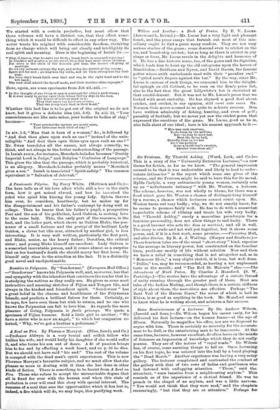The Voice of the Spirit. By Howard Swan. 2 vols.
(Sampson Low and Co.)—The sub-title of the book is this, "Literary Passages from the Bible Rewritten, Idea for Idea, in Modern Style." Book I. contains Job, Joel, and Psalms lxix. and xxii. ; Book IL, Isaiah. The Bible changed from the language with which we are familiar (not substantially altered, after all, by the Revisers) into literary English is not an attractive idea.
We started with a certain prejudice, but must allow that these volumes will have a distinct use, that they effect some- thing which it would be difficult to effect in any other way. The writer treats his original with considerable freedom, shrinbing from no change which will bring out clearly and intelligibly its real spirit and meaning. Here is the beginning of Isaiah liv. :—
" Sing, 0 barren, that brought not forth; break forth in song and rejoicing In laughter and gledae-s, go cry aloud, thou that host never borne children. Tor more is the child of the desolate girl than the tended off.pring of marriage.
Go let thy servants enlarge thy tent, and widen the stretch of thy canvas ; Spare not for coat ; go lengthen thy curds, and let them strengthen thy tent-
Peg"-
For thou sha.lt break forth over land and sea, to the right hand and to the left hand ;
Thy seed shall inherit the far-off lands, and their desolate cities repeople."
Here, again, are some specimens from Job xii.-xiii. :—
'In the thought of one living at ease is contempt for other's misfortune; It is ever ready to spring upon them whose footing slips in the race.
The homes of robbers grow rich; They that miser the Lord are secure ; They can grasp their food in their hand."
Whether this last line is to be got out of the original we do not know, but it gives a definite idea (xii. 5-6). In xiii. 12, "Your remembrances are like unto ashes, your bodies to bodies of clay," becomes- " Your noteworthy sayings RTO musty BRIM Your fortresses walla built of clay I " In xiv. 1-2, "Man that is born of a woman," &c., is followed by "And dost thou glare upon such an one F" instead of the unin- telligible "And dost thou open thine eyes upon such an one ? " Mr. Swan translates all the names, not always correctly, we think, and not always to the better understanding of the passage. In Isaiah xxxix., for instance, Merodach-baladan becomes "Doubly Imperial Lord is Judge," and Babylon "Confusion of Language." This gives the idea that the passage, which is probably historical, is an allegory. Merodach-baladan probably means " Merodach gives a son." Isaiah is translated " Spiritsidety." The common equivalent is" Salvation of Jehovah."







































 Previous page
Previous page